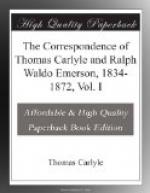My Dear Friend,—I am concerned at not hearing from you. I have written you two letters, one in October, one in November, I believe, since I had any tidings of you.* Your last letter is dated 27 June, 1835. I have counted all the chances of delay and miscarriage, and still am anxious lest you are ill, or have forgotten us. I have looked at the advertising sheet of the booksellers, but it promised nothing of the History. I thought I had made the happiest truce with sorrow in having the promise of your coming,—I was to take possession of a new kingdom of virtue and friendship. Let not the new wine mourn. Speak to me out of the wide silence. Many friends inquire of me concerning you, and you must write some word immediately on receipt of this sheet.
------------ * One in August by Mrs. Child, apparently not delivered, and one, the preceding, in October. -----------
With it goes an American reprint of the Sartor. Five hundred copies only make the edition, at one dollar a copy. About one hundred and fifty copies are subscribed for. How it will be received I know not. I am not very sanguine, for I often hear and read somewhat concerning its repulsive style. Certainly, I tell them, it is very odd. Yet I read a chapter lately with great pleasure. I send you also, with Dr. Channing’s regards and good wishes, a copy of his little work, lately published, on our great local question of Slavery.
You must have written me since July. I have reckoned upon your projected visit the ensuing summer or autumn, and have conjectured the starlike influences of a new spiritual element. Especially Lectures. My own experiments for one or two winters, and the readiness with which you embrace the work, have led me to think much and to expect much from this mode of addressing men. In New England the Lyceum, as we call it, is already a great institution. Beside the more elaborate courses of lectures in the cities, every country town has its weekly evening meeting, called a Lyceum, and every professional man in the place is called upon, in the course of the winter, to entertain his fellow-citizens with a discourse on whatever topic. The topics are miscellaneous as heart can wish. But in Boston, Lowell, Salem, courses are given by individuals. I see not why this is not the most flexible of all organs of opinion, from its popularity and from its newness permitting you to say what you think, without any shackles of prescription. The pulpit in our age certainly gives forth an obstructed and uncertain sound, and the faith of those in it, if men of genius, may differ so much from that of those under it, as to embarrass the conscience of the speaker, because so much is attributed to him from the fact of standing there. In the Lyceum nothing is presupposed. The orator is only responsible for what his lips articulate. Then what scope it allows! You may handle every member and relation of humanity. What could Homer, Socrates, or St. Paul say that cannot be said here? The audience is of all classes, and its character will be determined always by the name of the lecturer. Why may you not give the reins to your wit, your pathos, your philosophy, and become that good despot which the virtuous orator is?




